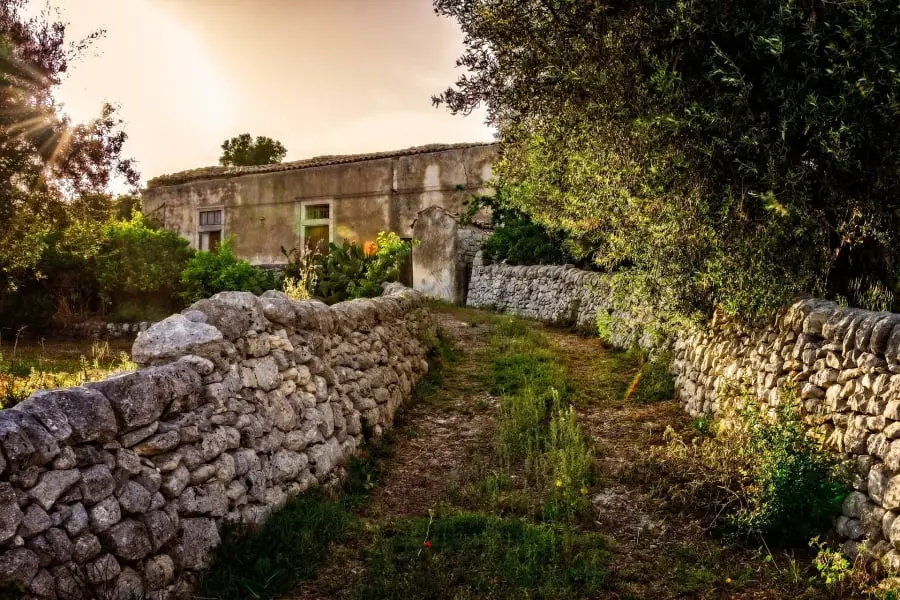As a homeowner, you may feel inclined to add a decorative twist to your driveway, especially if you live in a somewhat uniform suburban neighborhood. Perhaps you are looking for a cheaper alternative to paving. Regardless of your motivation, alternatives are available.
You most definitely can make a mulch driveway and it can even be more customizable than other options. With proper maintenance, borders, and weed control mulch can last as long as most parking surfaces. Paying attention to drainage and slope can also ensure success.
Mulch is one of these potential alternatives and, today, we take a look at its viability as a driveway surface. We will look at various types of mulch, and their benefits and drawbacks, to help you choose the best way to spice up your driveway. Let’s get started.

Contents
Can You Use Mulch For A Driveway?
When it comes to most driveways, paving is by far the popular choice. A driveway can be paved with asphalt, concrete, or blocks of brick and stone. Many homeowners opt for paved surfaces because of aesthetics, durability, and ease of maintenance. Stone and brick block driveways, in particular, can set a defining theme for your home.
Mulch can be a good surface for a driveway that resists over compaction, offers many color options, and can be replaces much easier than most surfaces. It can be spread with a simple pitchfork and as an added bonus, keeps down grass and weeds that could creep into gravel and dirt.
Now that we have established that it can be done. Let’s move onto the why.
Why Choose A Mulch Driveway
The choice of the mulch driveway over other options should only be undertaken after looking at the reasons it can fit some situations better than more traditional options.
A mulch driveway offers many more color and texture options than do pavement, concrete, or gravel. Mulch may be the right choice for the homeowner with a specific look in mind. There may be a bit more maintenance with organic versions, but inorganic ones can last as long as any other.
Let’s look at some of the more popular choices and see why some may want to consider mulch.
Paved Driveways
Paved driveways are not free from drawbacks. Asphalt, for example, has limited stylistic applications, while concrete is both expensive and prone to cracking over time.
Then there is the price. They are normally the most expensive options.
Dirt And Gravel Driveways
Dirt or gravel driveways are also a common choice, especially in rural areas. Homeowners with particularly long driveways may also choose to use gravel since it is the most cost affective surface besides dirt and mud. Gravel also has great drainage and it is easily replenished and compacted.
That said, gravel also has drawbacks. Firstly, it is a perpetual dust hub, which is not only annoying but potentially problematic for neighbor relations. Gravel is also susceptible to potholes over time as well as being difficult to snowplow during winter.
So, if you do not want to leave your driveway with bare dirt but are thinking of veering away from traditional paving, what else is there?
Well…mulch!
To read other articles you will like, see some of mine here…
- Convert Lawn Mower To Mulcher: Here’s How To Do It
- How To Keep Mulch From Blowing Away? Tips For Windy Areas
- Will Grass Grow Through Mulch? How To Prevent It.
There Are Multiple Types Of Mulch For A Driveway Surface
Although it is mostly used to protect and add (or retain) moisture for your lawn or plant beds, mulch can also be used to line driveways. Much like gravel or dirt, the reasons for using mulch may be practicality, aesthetics, a desire to be unique, or a combination of all three.
So, what type of mulch can you use?
Well, both organic and inorganic mulches can be used to form your driveway.
Organic Mulches For Parking Surfaces
When it comes to organic mulches, though, you are pretty much limited to wood chips or pine needles. Cedarwood chips are particularly interesting as they have a very pleasant aroma.
While there is a risk that wood chips could float away if exposed to a lot of water, there is an equally good chance that this kind of mulch will improve the permeability of the soil below.
Unfortunately, wood chips are prone to rot eventually and they require a long time to dry out if they ever get wet. They may also be washed away during heavy rains if your driveway is sloped.
Most other organic mulches, such as straw, leaves, or sawdust are simply too impractical for use as driveway lining.
Leaves and straw, in particular, are lightweight and can be blown away by strong winds at a moment’s notice. Even driving over the mulch would blow it out of position. Finally, even if you did manage to set up a leaf driveway, for instance, you would likely land in hot water with your neighbors as your leaves spread to their yards!
Inorganic Mulch Driveways
Inorganic mulches are another way to go. These include stones, landscape fabric, rubber mulch, plastic sheeting, and the aforementioned gravel. The biggest edge inorganic mulches have over organic mulches is the fact that they do not rot and, therefore, do not need to be replenished as frequently.
Stones Or Pebbles
Stones or pebbles are arguably the most commonly used mulch when it comes to lining driveways. The use of stones, when executed tastefully, can rival even the best paving work in terms of practicality and aesthetics. Stones are the heaviest form of mulch and they are much less likely to be shifted by wind or rain unless you have major sloping.
If your driveway is right next to your lawn, we recommend that you set up a boundary to prevent the stones from getting to the grass. This boundary can be made up of larger rocks or bricks. Stones in the grass can prove to be highly problematic when it’s time to mow your lawn.
The problem with a stone mulch driveway is that certain types of stones are quite pricey. Also, some types of stone are quite sharp, meaning you will always have to be wearing shoes when walking across the driveway.
Can You Use Rubber Mulch For A Driveway?
Rubber mulch is another popular type of mulch, although it’s not commonly used for driveways. Like stones, rubber doesn’t decompose, although some variants may lose color after a few years. While it is lighter than stones, rubber mulch is still quite heavy and hard to shift but the use of boundaries is recommended to be on the safe side.
Rubber is also a good choice because it is friendlier on bare feet. This is especially beneficial if you have kids and pets who love running around the house. Aesthetically, rubber is also unique and it can make your home stand out in the neighborhood.
Yes, rubber mulch can be used for driveways and there are quite a few benefits of doing so.
The Benefits Of Using Rubber Mulch
If you are going to use a mulch, rubber may be just the material for your needs.
- Firstly, rubber mulch is very durable. Rubber mulch can last for more than a decade, which means you won’t have to re-apply it very often. It is also not susceptible to the cracking and warping that afflicts concrete and asphalt, for instance.
- Rubber is also a good choice for your driveway because it doesn’t retain moisture like organic mulches. This means there is minimal chance of weed growth, which will save you labor. Also, the lack of moisture retention allows it to remain grippy all year round. The chances of you or your vehicles slipping or skidding on rubber mulch are almost zero, regardless of the conditions.
- Another great thing about rubber is its affordability, especially when compared to concrete. The installation and labor costs are also much cheaper than that of a stone-paved driveway.
- Finally, as we’ve already established, rubber mulch driveways are quite rare. This will increase your home’s curb appeal and make for great first impressions.
How To Use Mulch As A Driveway
If you’ve got your heart (and wallet) set on a mulch driveway, there are a few things you need to know.
1 – Bylaws About Parking Surfaces
Firstly, you need to find out if your city or homeowners’ association allows the use of mulch for driveways. This has to be done before you waste considerable time, effort, and money on the driveway lining.
2 – Driveway Sloping For Drainage
Secondly, you should ensure that your driveway has very minimal sloping, especially if you want to use light mulches. Slopes increase the mulch’s vulnerability to erosion by water or wind.
3 – Define Edges
To maintain neatness, you should make use of edge borders to separate the mulch driveway from your lawn.
4 – Choose Your Mulch
If you want to use organic mulch, we recommend that you stick to wood chips or pine needles as these are not as easy to shift as straw or leaves. However, be prepared to reapply the mulch over time, especially during the wet seasons, otherwise, it may develop a bad smell.
5 – Weed Control For Driveways
Inorganic mulches such as stones and rubber mulch may also be paired with landscape fabric or plastic sheeting to eliminate the growth of weeds. The fabric or sheeting must be laid down on the driveway before the stones or rubber mulch are placed on top.
6 – Get Creative With Mulch
If your creative juices are in free flow, you may use different kinds of mulch for your driveway. Stones and pine needles, for example, are a good inorganic/organic mulch combination you can use to make your yard stand out.
Major Disadvantages Of A Mulch Driveway
As we’ve already seen, using mulch for your driveway is not always a problem-free choice.
For starters, you can never really take your eye off the mulch. You always need to ensure that it is in position and not being shifted. In most cases, other maintenance issues are never far away. Oftentimes, you have to take extra measures (edge borders, terracing, plastic sheeting) to ensure your “driveway” doesn’t get washed or blown away.
Mulch driveways also share some of the same weed and grass infiltration problems that dirt and gravel driveways have.
Organic mulches are particularly demanding. Since they are (usually) so light, they require constant repositioning and re-raking. Their decomposition also means you have to replace them frequently.
The Final Touches On Using Mulch For Driveway Surfaces…
The driveway surface is a personal choice for some or mandated by bylaws and regulations for others. After determining if you are able to use mulch as a driveway surface the creativity can begin.
Whether you stick with the tried and true or attempt something different and new, it can be practical with proper maintenance. It is a great way to put your own stamp on what is normally is a bland and overlooked aspect of your home.
Take a look at some of these other articles that you will like…
- Convert Lawn Mower To Mulcher: Here’s How To Do It
- How To Keep Mulch From Blowing Away? Tips For Windy Areas
- Will Grass Grow Through Mulch? How To Prevent It.
References
https://rubbermulch.com/blogs/rubbermulch/can-rubber-mulch-be-used-for-driveways
